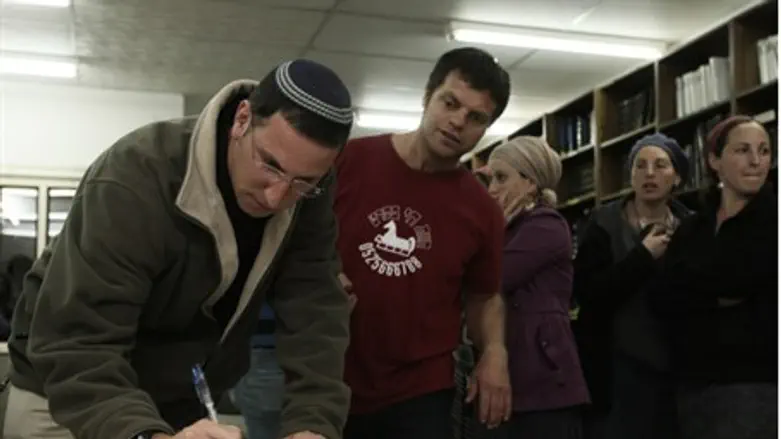
Residents of the community of Migron in Binyamin, who signed an agreement that will have them leave their homes at the current site and move to a permanent neighborhood nearby, expressed mixed feelings about the agreement.
The agreement calls for the community to be relocated to its permanent location, near the Psagot Winery, in two years' time. The present site will be handed over to the Civil Administration. The existing structures at the site will be torn down but a "public site" may be established at the location instead of a residential community.
In any case, the location of the present Migron will remain Jewish and will not be handed over to Arab control.
The residents noted on Sunday that they agreed to the agreement “with a heavy heart” but added that they have a national responsibility to fulfill a ruling of the Supreme Court.
The Supreme Court had ordered that the 11-year-old community of more than 40 families must be demolished by the end of March, after it ruled their homes were not built on state land, despite the failure of Peace Now and Arabs to prove who owned the land. The area had not been zoned, but the state had shown acquiescence by helping the residents with infrastructure.
Aviela Deitch, a resident of Migron, told Arutz Sheva that the signing of the agreement is “not something we did willingly or happily.”
She stressed that the residents of the community will be building their new homes on their own and will not be receiving them as a gift.
“As it is stated in the documents, this is on a timeline,” said Deitch. “If there were to be any glitches in the system and anything would not happen on schedule, we would be homeless at that point, but one would be hoping that wouldn’t happen.”
She explained that Migron sits on land that is considered “abandoned property” because at one point the land had a name attached to it. This is because, when the area was under Jordanian rule, the King of Jordan split the land into 60 pieces and gave the pieces to 60 families on condition that they farm the land within three years. By the time 1967 came around and Israel liberated the area, the land had not been farmed and had gone back to being owned by the Jordanian King. However, as Deitch explained, the land was still considered abandoned property rather than state-owned land, because at some point it had a name attached to it.
Despite all this, she explained, Peace Now has been unable to prove that the land belongs to any specific Arab.
“[Peace Now] has presented people who say they used to farm lentils here or what have you, but this is land that didn’t belong to anybody,” stressed Deitch. “Peace Now is using this as a stepping stone to get rid of the settlement enterprise and essentially get rid of the State of Israel.”
Deitch also spoke about the feelings of the children in the community about having to relocate, saying that some of her younger children are still going through the trauma they experienced when three homes were demolished in the middle of the night back in September.
“All they want to hear is that there won’t be bad guys in black coming in the middle of the night,” she said, adding, “I have a 15-year-old and he’s three years away from the army. His motivation to go into top units has certainly dropped drastically. He’s having a hard time at school and the other teenagers are asking him, ‘Why did you sign to give away part of the land of Israel?’”
She added that the residents are unhappy that this ever had to happen, but are taking comfort in the fact that Minister Benny Begin, who brokered the deal, is supporting a community his party helped to found - and in the fact that their agreement to move prevented conflicts within Israeli society.